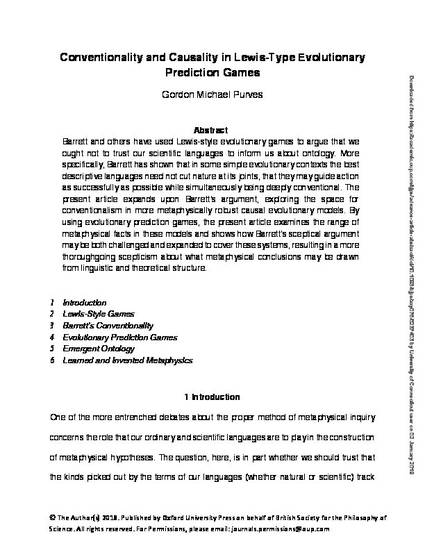
Article
Conventionality and Causality in Lewis-Type Evolutionary Prediction Games
Conventionality and Causality in Lewis-Type Evolutionary Prediction Games
(2018)
Abstract
Barrett and others have used Lewis-style evolutionary games to argue that we ought not to trust our scientific languages to inform us about ontology. More specifically, Barrett has shown that in some simple evolutionary contexts the best descriptive languages need not cut nature at its joints, that they may guide action as successfully as possible while simultaneously being deeply conventional. The present article expands upon Barrett’s argument, exploring the space for conventionalism in more metaphysically robust causal evolutionary models. By using evolutionary prediction games, the present article examines the range of metaphysical facts in these models and shows how Barrett’s sceptical argument may be both challenged and expanded to cover these systems, resulting in a more thoroughgoing scepticism about what metaphysical conclusions may be drawn from linguistic and theoretical structure.
Keywords
- Ontology,
- Scientific languages
Disciplines
Publication Date
December, 2018
DOI
10.1093/bjps/axy076
Publisher Statement
This is a pre-copyedited, author-produced version of an article accepted for publication inThe British Journal for the Philosophy of Science following peer review. The version of record Purves, G. (2018). Conventionality and causality in Lewis-type evolutionary prediction games. The British Journal for the Philosophy of Science. doi: 10.1093/bjps/axy076 is available online at: https://academic.oup.com/bjps/advance-article-abstract/doi/10.1093/bjps/axy076/5237403
Citation Information
Purves, G. (2018). Conventionality and causality in Lewis-type evolutionary prediction games. The British Journal for the Philosophy of Science. doi: 10.1093/bjps/axy076.
